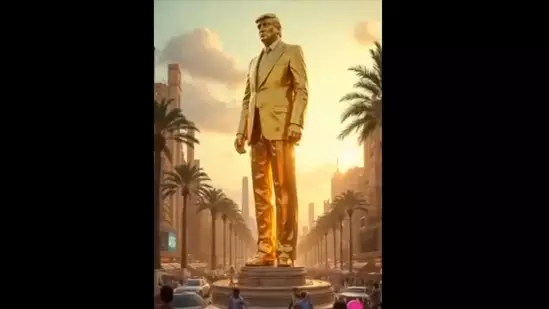In a move that has stirred considerable attention, former President Donald Trump recently shared an AI-generated video on his Truth Social platform, presenting a vision for Gaza that many have deemed unrealistic and insensitive. The video, lacking any descriptive caption, opens with grim visuals of the war-torn region, juxtaposed with an overly optimistic slogan: “Gaza 2025… What’s Next?” This shift from devastation to a resplendent, redesigned Gaza—complete with gold statues of Trump, luxurious beaches, and AI-generated celebrities—poses the question: is this a genuine plan for rehabilitation or merely a superficial fantasy designed to revive Trump’s personal brand?
The video’s stylistic choices highlight an odd disparity between its hopeful message and the harsh realities of life in Gaza. Transitioning from images of conflict to scenes depicting a bright new world, it uses catchy jingle lyrics that promise liberation and prosperity. The refrain, “Donald’s coming to set you free,” emphasizes a messianic complex, as Trump appears alongside both AI-generated billionaire Elon Musk and Israeli Prime Minister Benjamin Netanyahu in idyllic settings. However, these representations come across as caricatures devoid of the profound complexities surrounding Gaza, reducing the region’s struggles to a mere backdrop for a fantastical capitalist venture.
The portrayal of wealth and transformation, replete with extravagant visuals, fails to regard the sociopolitical realities and historical grievances of the Palestinian people. Critics contend that such unrealistic depictions diminish the lived experiences of those affected by ongoing strife, making the entire presentation feel more like a marketing ploy than a serious policy proposal. As Wassel Abu Yousuf of the Palestine Liberation Organization aptly remarked, the video feels like “a clowning gimmick,” further indicating a disconnect between Trump’s vision and the harsh truths of the Palestinian struggle for sovereignty and peace.
At a recent press conference, Trump announced a more assertive proposal, claiming he would take control of the Gaza Strip and mesh reconstruction efforts with American oversight, despite the ambiguous nature of what this entails. His assertions of “owning” the territory were met with skepticism both from Palestinian leaders and in international diplomacy circles. The phrase “We’ll own it” carries a colonial undertone, alarming those attuned to the historical context of land occupation.
Despite Trump’s confidence in his plan, responses from neighboring Arab nations have highlighted the likelihood of backlash. Countries such as Egypt, Jordan, and regional players voiced concern during a meeting in Saudi Arabia aimed at preserving Palestinian rights and stability. The broad opposition hinting at deeper regional ramifications suggests that unilateral proposals by one country can undermine broader geopolitical relationships, leading to further unrest.
The underlying complexity of Gaza’s situation requires nuanced and culturally sensitive solutions that take into account the voices and rights of its residents. Trump’s approach, which dismisses these considerations for the sake of branding and spectacle, has the potential to alienate rather than unite.
The backdrop of Trump’s AI fantasy raises an essential conversation around the ethics of representation and development in politically sensitive areas. As the world grapples with the humanitarian crises stemming from ongoing conflicts, solutions that prioritize sustainable development and genuine engagement with local communities are imperative. Trivializing the needs and identities of the people of Gaza through oversimplified visuals only serves to fuel further disillusionment and resentment.
Trump’s recent endeavor exemplifies how political messaging can morph into contentious representations, with implications reaching beyond national borders. As the international community reflects on the provocations stirred by his AI-generated imagery, it becomes increasingly vital to ensure that conversations surrounding Gaza’s future revolve around authentic dialogue, respect for historical context, and a commitment to peace—not hollow promises or celebrity-driven fantasies.
